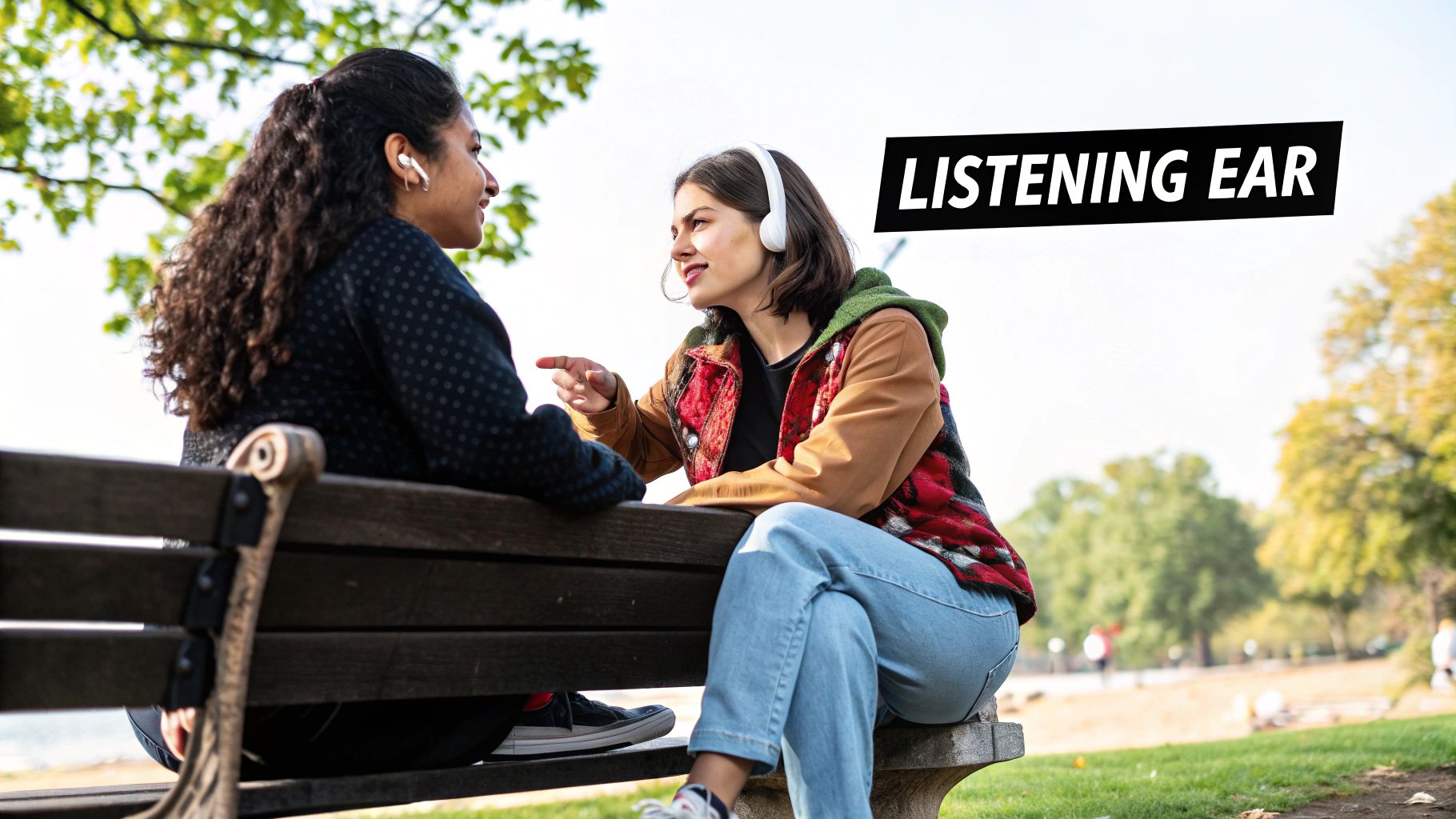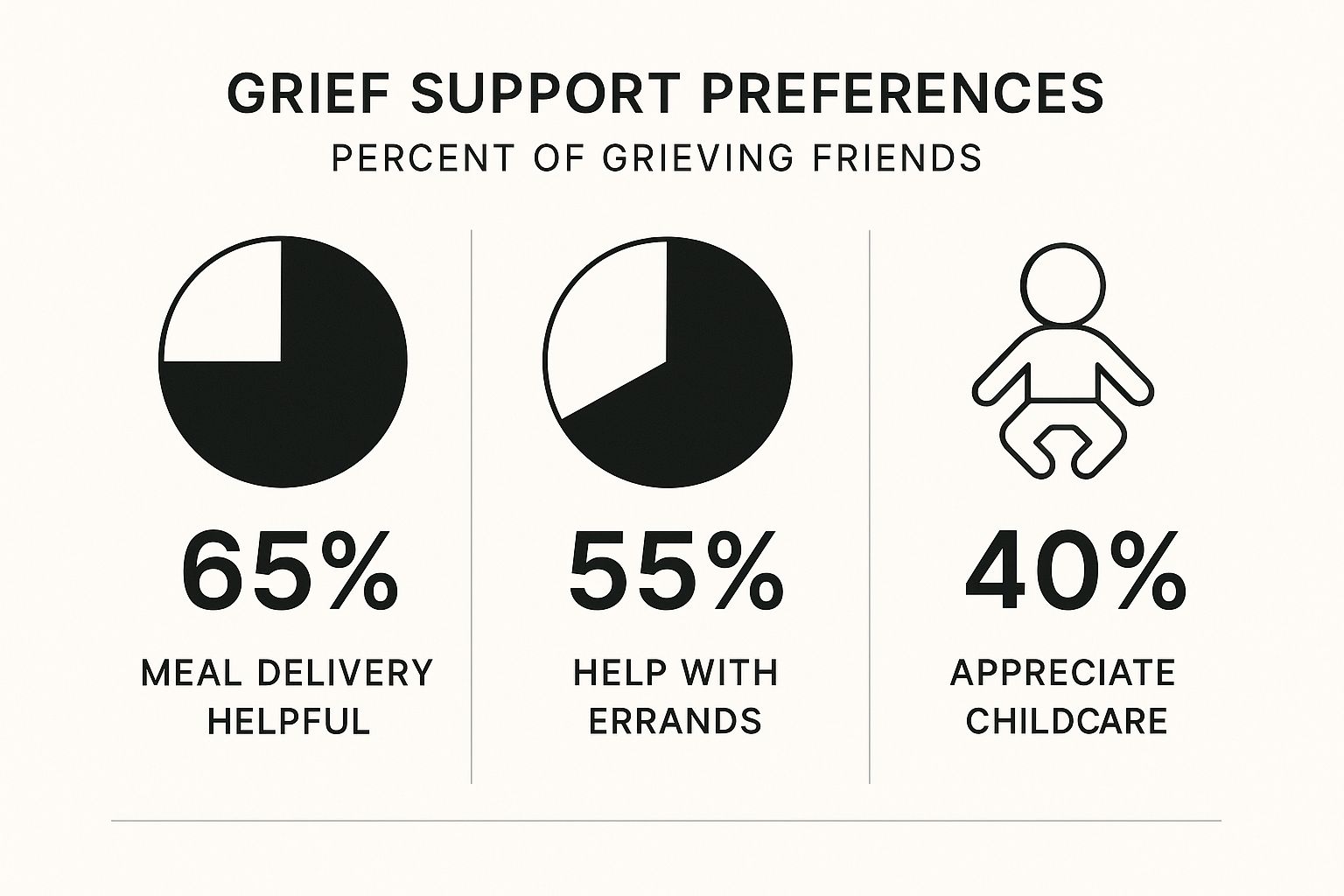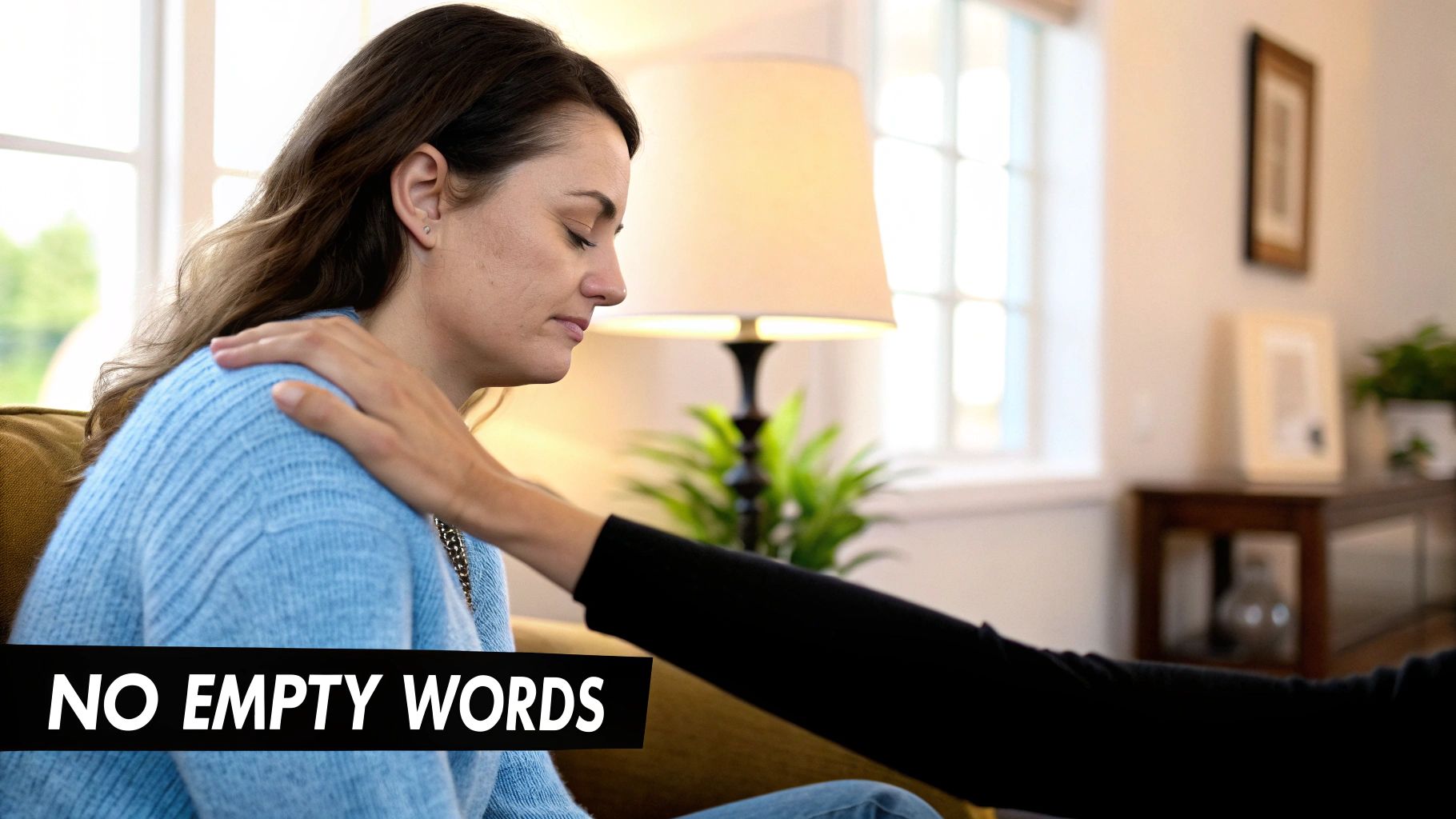When a friend is grieving, it’s easy to get stuck wondering what to do or say. We worry about saying the wrong thing, making it worse, or overstepping. But here’s the most important thing I’ve learned: your steady presence means more than finding the perfect words.
This is about showing up, consistently and quietly, in the ways that matter most. Forget the clichés. Let's talk about real, practical ways to be the support your friend actually needs right now.
Understanding How to Be There for a Friend
It's natural to feel a bit helpless when someone you love is hurting. The truth is, you can’t fix their pain, and that's okay. Your job isn't to be a problem-solver; it's to be a compassionate companion on a very difficult road.
This guide will walk you through tangible ways to help, from handling tough conversations with grace to providing the kind of long-term support that helps people feel less alone.
Core Principles of Compassionate Support
Everyone's journey through grief is different—there's no script to follow. But a few core principles can guide you, helping you offer support that is both meaningful and respectful.
Before jumping into specific actions, let's look at the foundational mindsets that make a real difference.
| Principle | What It Looks Like in Action |
|---|---|
| Acknowledge Their Pain | "I can't imagine how hard this is for you." It shows you see them without trying to fix them. |
| Listen More Than You Speak | Create a safe space for them to talk, vent, or just sit in silence. No pressure. |
| Avoid Comparisons | Steer clear of "I know how you feel." Every loss is unique, and comparisons can invalidate their feelings. |
| Respect Their Process | Grief has no schedule. Follow their lead. Some days they might want company, others they'll need space. |
Grief is a disorienting, isolating experience. By grounding your support in these principles, you can provide a stable, non-judgmental presence that helps your friend navigate their new reality.
"Grief is love with nowhere to go—and it continues to exist each and every day moving forward. To support someone through grief, it’s really about showing up with compassion and meeting them where they are."
Ultimately, the best thing you can do is show up, listen, and let them know they aren't walking this path alone. And if you're looking for more insight into the process itself, this article on how to cope with loss offers some valuable perspective. Your willingness to just be there is the most powerful gift you can give.
Offering Practical Help Beyond Words
When someone is lost in the fog of grief, the classic "let me know if you need anything" can feel like just another burden. Most people in that state don't have the clarity or energy to figure out what they need, much less ask for it. The best thing you can do is skip the vague offers and jump in with specific, practical support.
This simple shift—from asking what they need to suggesting what you can do—moves the weight off their shoulders and onto yours. It’s a profoundly helpful gesture. And with over 57% of Americans having faced a major loss in the last three years, according to recent surveys, millions are navigating this disorienting new reality. You can read more about these bereavement trends in the full report.

Making Your Offer Easy to Accept
The goal is to make your help so easy to receive that all they have to do is say "yes." Think about concrete tasks that you can propose directly.
- Handle Meals: Don't ask if they're hungry. Instead, try, “I’m dropping off a lasagna for you tomorrow night. Any allergies I should know about?”
- Manage Errands: A quick text like, “I’m at the grocery store. What can I grab for you?” is a game-changer.
- Take on Chores: Offer to handle a specific, recurring task. “I can walk the dog every morning this week,” or “Let me take care of mowing the lawn this weekend.”
These aren't grand gestures, but they chip away at the mountain of daily tasks that suddenly feel impossible. You're showing up in a tangible, reliable way that speaks louder than words.
By taking the initiative with specific offers, you’re not just providing help—you’re giving them the precious gift of one less thing to worry about.
Logistical planning can feel especially crushing. If your friend is responsible for funeral or memorial arrangements, offer to tackle a discrete piece of the puzzle. You could research venues, find local caterers, or even explore unique tribute ideas like Aerial Ash Scattering. Taking even one of these research tasks off their plate is a massive relief. For more ideas on how to help with this, you can check out our memorial service planning checklist.
Navigating Conversations with Empathy
Let's be honest: finding the right words when a friend is grieving can feel paralyzing. We get so caught up in the fear of saying the wrong thing that we sometimes default to saying nothing at all. But your presence and genuine care are far more powerful than finding some "perfect" phrase.
The real goal is to validate their feelings, not to try and fix them. A simple, heartfelt, “This must be so incredibly hard,” or “I’m so sorry you’re going through this,” speaks volumes. It acknowledges their pain and gives them permission to feel whatever they’re feeling, opening the door for them to share more if they want to.

What to Say and What to Avoid
It’s so easy to lean on the clichés we’ve all heard before. Phrases like "they're in a better place" are usually well-intentioned, but they can inadvertently make someone feel like their grief is being dismissed or misunderstood.
Here’s a look at how you can shift your language to be genuinely supportive.
Helpful vs Harmful Phrases in Grief
Sometimes, a small change in what we say can make a world of difference. This table offers a direct comparison of phrases that offer genuine comfort versus those that can inadvertently cause more pain.
| Instead Of This... | Try Saying This... |
|---|---|
| "They're in a better place." | "This is such a devastating loss. I'm thinking of you." |
| "Let me know if you need anything." | "I can bring over dinner Tuesday or Thursday. Which works better?" |
| "Everything happens for a reason." | "There are no words. I'm just here to listen if you want to talk." |
| "Be strong." | "It's okay to not be okay. Whatever you're feeling is valid." |
These examples show how focusing on concrete, present support is always better than offering abstract platitudes. For even more guidance, we've put together a resource with more words of inspiration after a death that you might find helpful.
Don't underestimate the power of quiet, too. You don't need to fill every moment with words. Sometimes, just sitting with your friend in silence is the most profound comfort you can offer. It lets them know they don’t have to perform or put on a brave face for you.
When the time feels right, sharing a fond, specific memory of the person who passed can be a beautiful gift. It affirms their life and legacy, showing your friend that their loved one is not forgotten.
This simple act of remembrance can be incredibly powerful. It reinforces that the love they shared still matters and helps keep the person’s spirit alive in a meaningful way.
Sustaining Your Support for the Long Haul
In the immediate aftermath of a loss, there's often a flood of support—meals arrive, flowers fill the room, and messages pour in. It’s a beautiful, powerful display of community. But as weeks turn into months, that wave inevitably recedes.
This is where your friendship becomes truly invaluable. Grief isn’t over when the casseroles stop coming. The long, quiet road of navigating a new reality is often the hardest part, and your steady presence can make all the difference. Think of it as a marathon, not a sprint.

Staying Connected When Others Fade Away
One of the most profound things you can do is simply remember. Life moves on for everyone else, but for your friend, certain dates on the calendar are landmines of pain.
Pop these dates into your own calendar so you don't forget:
- The anniversary of the death
- The birthday of the person who passed
- Your friend's own birthday, which will now feel very different
- Holidays, anniversaries, or other special occasions they used to share
A simple text message on those days can be a lifeline. Something as simple as, “Hey, I know today might be tough. Thinking of you and sending a little extra love,” shows them you haven't forgotten. It acknowledges their pain without demanding a long conversation, reminding them that they aren’t alone in their remembrance.
The hardest part of grief is often not the initial shock, but the quiet that comes after. Continuing to show up, even in small ways, reminds your friend that their loss still matters to others.
Recognizing When More Help Is Needed
Your support is a vital piece of the puzzle, but it's important to remember that you're a friend, not a therapist. It's crucial to be aware of the signs that your friend's grief might be moving into a more complicated space.
For some, the pain doesn't lessen with time and can become a chronic, debilitating condition. Research indicates that nearly 9.8% of bereaved adults may experience Prolonged Grief Disorder (PGD), where the acute sense of loss remains intensely disruptive.
If you notice your friend is stuck and unable to manage daily life long after the loss, it might be time to gently suggest professional support. Knowing when to point them toward someone with specialized training is a critical part of understanding how to support a grieving friend. A great first step is learning about the available resources and understanding what grief counseling is and how it can help.
Helping Them Plan a Meaningful Farewell
Trying to plan a memorial service while you're deep in grief is just overwhelming. It's a huge emotional weight on top of a massive logistical puzzle. This is a very real, tangible place where you can step in and make a difference. The key is to help lighten their load without adding to their stress.
Instead of a vague, "Let me know what I can do for the service," try offering to take on specific, concrete tasks. Think about the things that require time and energy they just don't have right now. You could say something like, "Would it help if I researched a few local venues or caterers for you?" or, "I have some time this afternoon—I could make those calls to coordinate with out-of-town family if you like." This approach is so much more helpful because it removes the mental burden of delegating. They don't have to figure out what you can do; you've already offered a solution.
Creating a Personal Tribute
One of the most powerful ways you can show up for your friend is by helping them shape a service that truly feels like a reflection of the person they lost. It’s about honoring their loved one's unique personality and spirit.
You could offer to be the point person for gathering photos for a slideshow. Or maybe you could reach out to a list of close friends and family, asking them to send a favorite memory or story that can be shared. These are the small, personal touches that make a service feel authentic and deeply moving.
A truly meaningful farewell is one that captures the essence of the person being remembered. Helping your friend create that kind of tribute is a gift of both practical support and profound emotional care.
Sometimes, a unique and symbolic act can bring a powerful sense of peace and closure. This might mean exploring something less traditional, like an Aerial Ash Scattering service, which can be an incredibly beautiful and cathartic way to say goodbye. As you help them think through the options, our guide on how to plan a memorial service can offer more ideas and a bit of structure. Ultimately, your role is to be a steady presence, helping them find the farewell that feels right, one step at a time.
Common Questions About Grief Support

When a friend is grieving, it can feel like you're walking on eggshells. You want so badly to help, but every word feels wrong and you're terrified of making things worse. It's completely normal to feel uncertain. Let's walk through some of the most common questions people have so you can offer support with more confidence and compassion.
It's helpful to know that most people (58.4%) are considered at low risk for developing complicated grief. They have the resilience to move through their loss with the support of friends and family like you. Research on public health approaches to bereavement confirms this, showing that a strong support network is often the most critical factor. This is where you come in.
That statistic really highlights just how important your role is. You are their frontline support.
What If My Friend Pushes Me Away?
First, don't take it personally. It’s incredibly common for someone deep in grief to pull away or seem distant. Their entire world has been shattered, and they simply might not have the energy to socialize or even respond to a text.
The best thing you can do is offer gentle, consistent support without any expectations. It’s all about showing up in small, low-pressure ways.
- Send a quick text: "Just thinking about you today. No need to reply."
- Drop off a coffee or a favorite snack on their porch. Don't knock or wait for them to answer—just leave it as a small sign you care.
These quiet acts of kindness send a powerful message: "I'm still here for you, whenever you're ready."
How Can I Talk About the Person Who Died?
This is a big one. Many people avoid mentioning the person who died for fear of causing more pain, but often, the opposite is true. Hearing their loved one's name can feel like a gift, a validation that they haven't been forgotten.
A great way to gently open the door is by sharing a fond, specific memory.
Try saying something like, “I was just remembering that hilarious time [Name] told that story at dinner…” and see how your friend responds. If they engage and smile, you can continue. If they seem uncomfortable or change the subject, that's okay too. Just follow their lead.
The goal is simply to show that the person they lost is still remembered and cherished. By letting your friend guide the conversation, you create a safe space for them to share—or not share—without any pressure.
When you're wondering how to support a grieving friend, often the most powerful thing you can offer is your steady, quiet presence.
Creating a meaningful farewell is an essential part of the healing journey. At Aerial Ash Scattering, we offer a beautiful and dignified way to honor a loved one's final wishes with a unique memorial service from the sky. To learn more about our services, please visit us at https://ashdive.com.


